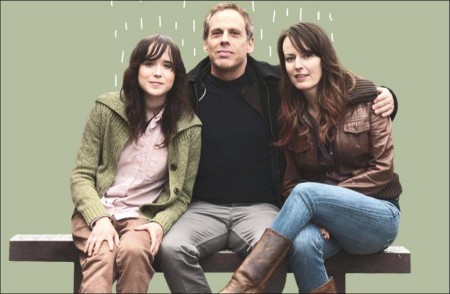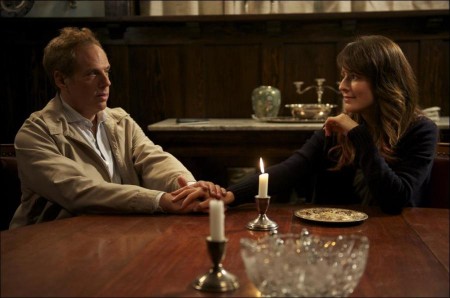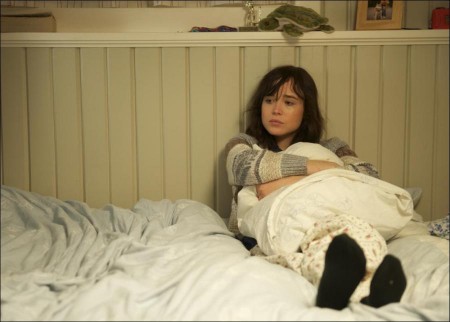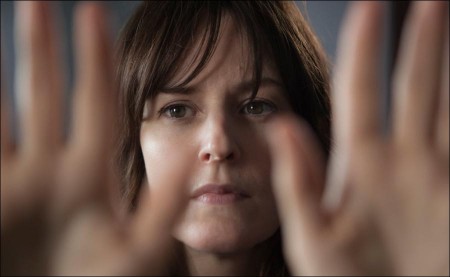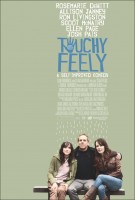Touchy Feely is a closely observed examination of a family whose delicate psychic balance suddenly unravels. Abby (Rosemarie DeWitt), is a sought after massage therapist and a free spirit, while her brother Paul (Josh Pais) thrives on routine and convention, running a flagging dental practice and co-dependently enlisting the assistance of his emotionally stunted daughter Jenny (Ellen Page). Suddenly, transformation touches everyone. Abby develops an uncontrollable aversion to bodily contact, which not only makes her occupation impossible but severely hinders the passionate love life between her and her boyfriend (Scoot McNairy).
Meanwhile, rumors of Paul’s “healing touch” begin to miraculously invigorate his practice as well as his life outside the office. As Abby navigates her way through a soul-searching identity crisis, her formerly skeptical brother discovers a whole new side of himself. Touchy Feely is about the experience of living in one’s own skin, both literally and figuratively. The film, written and directed by Shelton, and co-starring Allison Janney, Ron Livingston, and newcomer Tomo Nakayama (of the indie rock band Grand Hallway), is filmed on location in Shelton’s hometown and urban muse of Seattle.
About Touchy Feely (2013)
Over the past few years Lynn Shelton has established herself as a distinct helmer of offbeat indie dramedies, with her two latest features (Humpday and Your Sister’s Sister) offering an artfully measured ratio of two parts quirky comedy to one part soul-searching drama. Both of those films were pared-down affairs built around three primary characters. For her latest feature, Touchy Feely, Shelton decided it was time to explore something new. “My previous three films had three main characters and one key location,” Shelton explains. “I wanted to break out of that formula and do something more expansive. I was drawn to the idea of an ensemble cast, something along the lines of Short Cuts or Hannah And Her Sisters.”
In addition to the idea of working with a larger cast, Shelton was also intrigued by the prospect of making a more aesthetically oriented film, something she hadn’t done in quite some time. “Before directing narrative features, I was an editor of other people’s films, but I also made very expressive, personal art films. My initial impulse as a narrative filmmaker (We Go Way Back, 2006) was to tell a story that had room for an experimental, experiential, approach to storytelling. My second, third and fourth features were very observational and very dialogue-driven; there was little opportunity to include visual poetry, or sound and music-driven cinematic language, as I had with my first feature.
I think cinema is probably the best medium we have to represent interior human experience. That combination of sound and picture is so powerful! You can create something visceral and very sensual. I was yearning to go back to that kind of territory, — a more interior, emotional kind of film.” However, this new stylized approach didn’t hinder Shelton from including the kind of comedy that has become a key component of what she does. “I think the comedic aspects are a good complement to this kind of filmmaking. They enable people to open up more to the emotional experience.”
Shelton had an idea of the direction she wanted her next film to move in, and had a general starting point, but she was still searching for inspiration when two fortuitous meetings occurred. “I’ve had an idea for a while about what if you were a dermatologist or doctor or massage therapist, someone who has to deal with the bodies of strangers on an intimate level, and then you suddenly reach a threshold where you just can’t do it anymore? Bodies are so intense.
They’re weird and crazy; nobody has a perfect body. When I met Rosemarie [DeWitt], this character started coming up again for me. I had worked with her on my last film and now, with her in mind, the character started to flesh itself out, to become more real to me.” DeWitt, who was one of the leads in Your Sister’s Sister, noticed a difference from the start with her involvement in Touchy Feely.
“With Your Sister’s Sister, I got a call from Lynn on a Saturday and we were shooting on Tuesday. We didn’t have any time to spend together beforehand, talking about the character. The whole shoot was maybe twelve days. With this film, she had mentioned the idea to me maybe a year earlier, and we’d talked about it a bit. Touchy Feely is a very internal story, it gets inside the characters’ heads, it’s not super-conversational, so the trick here was to convey the story Lynn wanted to tell. It was trying to open yourself up to the unknown.”
DeWitt would prove to be one half of the primary equation. At a Tribeca Film Festival screening of Nicole Holofcener’s Please Give, Shelton met Josh Pais, a standout character actor recognizable for his work in that film, as well as Adventureland and Arbitrage, among many other movies.
“I had been a big admirer of Josh’s for a while, ever since seeing him in Year of the Dog. When I first met him, I was this geeked out superfan. He was very gracious, and then, when he found out I directed Humpday, he kind of flipped out on me! He loved that film. So we decided we had to work together. We talked on and off for a while, and we sort of had an idea about a character who goes through a transformation, and I decided to combine it with the massage therapist idea I had for Rosemarie. So I called the two of them up when I had an opening in my schedule – I would’ve shot something else if they hadn’t been available, I couldn’t have recast them – but they were both available, and everything came together around those two central storylines.”
For Pais, the discussions with Shelton about a character who goes through a transformation were key in upping his excitement for the project. “I had seen this postcard in some bookshop of a guy who was this odd, bearded guy, looked like he was trying to create some new age-y thing,” Pais explains. “I thought, what a great character that would be, to have fun with the cult side of the new age movement. Lynn had the idea of, what if he’s a dentist who comes up with a way to heal people, and that’s how his following emerges? In the movie, by no means is my character aware of anything new age at all, it’s completely foreign to him until he’s exposed to it, but he does have a following all of a sudden, when he becomes able to heal people.”
Bodies, Healing and Finding Catharsis (2013)
The story of Touchy Feely originated with two healers who find themselves embarking on journeys of self-exploration they didn’t know were possible. Abby (Rosemarie DeWitt) is a massage therapist living in Shelton’s hometown of Seattle. She’s dating a younger guy, Jesse (Scoot McNairy), and seems to have things pretty much together – until Jesse asks Abby to move in with him, to which she agrees, but not without reservations. Soon after, Abby finds herself undergoing a professional and personal crisis as she develops an aversion to physical contact, becoming unable to do her job while growing increasingly confused about her feelings toward Jesse.
Meanwhile, Abby’s brother Paul (Josh Pais), a buttoned-up dentist with social anxiety, finds himself revered as a healer after he becomes able to somehow cure his patients of various ailments. His newfound popularity is something he finds both terrifying and, ultimately, exciting. The link between Abby and Paul is Jenny (Ellen Page), Paul’s daughter (and Abby’s niece). Jenny works as Paul’s assistant at the dental office, but we sense that Jenny – consciously or not – longs for bigger and more exciting things for herself. She’s also developed a massive crush on Jesse, as much of a mistake as that may be. As the narratives of these four characters interact, it becomes clear that Touchy Feely is a film about intimacy and healing, and how it’s impossible to truly heal others until we get in touch with our own intimate desires and issues, however painful that process may be.
For Shelton, the film’s exploration of identity was crucial. “I’m constantly pulled to the theme of bucking expectations, especially around identity. We think we know who we are, and then evidence to the contrary presents itself and we have to deal with that. I think Paul is terrified by the idea that there may be more to him than he thought, while Abby goes into a temporary depression when the foundation for her self-worth, her abilities as a healer, is taken away from her. For Paul, I think he figures he’s in his mid-40s and this is who he is, who he’ll always be. He’s not going to seek anything new out. So this opportunity to open a door and wonder, is there more, is sort of shocking to him.
Paul and Abby seem like they’re going in opposite directions, and they are, but what ties them together is looking beneath the surface. Abby has just been bouncing along with this idea that she’s free-spirited and a healer, enlightened, she thinks she knows who she is, and then she’s forced by this mysterious thing to have to dive a little deeper. To look under the surface and find herself again, or ground herself in a new way.”
Pais understood that much of the drama in Paul was portraying a man whose entire sense of self has just been pulled out from under him. “I think for a lot of people change is disorienting, but I think it’s especially disorienting for Paul, who’s locked into this mode of being invisible, and then all of a sudden people are looking at him like he has special powers. He doesn’t go into an ego place with it – he can’t process it. It’s about him letting go of certainty – life starts to become spontaneous and he doesn’t have the tools to ride spontaneity. Part of his journey is to let life unfold and go on the journey, as opposed to locking everything down and being dead.”
DeWitt felt that her character was also conflicted with regard to her own sense of self. “I’m not sure how much of Abby’s new-age attitude was her authentically finding it or rebelling against who her parents were and who her brother is. I think everybody wants to find out what they’re about and why they’re here, but what drove her into those realms was running away from something else. A lot of people are trying to figure it all out for themselves, but I don’t think she has all the answers yet. The movie is part of her journey, and after the film she’ll start the next part of her journey, but with her feet planted more firmly on the ground.”
Much of the film’s drama comes from how the dynamic between Paul and Abby – one being conservative, the other a free spirit – plays out in relation to the behavior of Jenny. Shelton immediately understood that Jenny would function as a sort of narrative connector for the other characters. “I knew that the brother-sister relationship would be at the center, and that they were different personalities. I liked the idea of Paul’s daughter – Abby’s niece – as a kind of glue. If two adult siblings don’t really get along, why would they hang out with each other? So Jenny is someone that they’re both deeply connected to. There’s actually a kind of tug-of-war going on.
Abby doesn’t want to see Jenny get stuck due to the influence Paul has over Jenny’s life, she doesn’t want to see her go down the wrong path. And I then started imagining Jenny having a really codependent relationship with Paul, really taking it upon herself to take care of him – but Jenny has really put off her own life as a result. And then thrown into the mix of Jenny’s interior life is being totally crushed out on her aunt’s boyfriend. It’s such a ridiculous person to be so hung up on, and it’s indicative of her generally being stuck.”
Pais credits the many credible varieties of his and Page’s onscreen dynamic – sometimes seeming like father/daughter, but sometimes more like bickering siblings – to Shelton’s directing methods. “Ellen and I just clicked. We got it. It was just one of those things where actors really get each other. There was a total trust and surrender to each other’s work. There’s a realm where something magical happens in acting, where all the stars align and it transcends something methodical, and it’s a surrender to what’s happening in the moment. Lynn, more than any director I’ve ever worked with, nurtures that magic. She allows you to do your absolute best work.”
The other key supporting character is Jesse, who is both Abby’s (younger) boyfriend and the object of Jenny’s longing. For DeWitt, Jesse’s suggestion that Abby move in with seemed like the catalyst for Abby’s breakdown. “I think the seriousness of Abby’s relationship with Jesse kind of snuck up on her. Abby’s divorced, so I think she got burned before, and despite her new age-y faux-openness, she actually shut something down there. Someone asking her to engage and take things to the next level leads to her dark night of the soul. I think the whole beauty of finding someone younger than her, more directionless than her, is that she didn’t think that he was a serious person, that it could develop into something serious – but it does.”
Of all the moments in Abby and Paul’s journeys toward self-discovery, one of the true standouts is a sequence in the third act where MDMA is taken by both characters, leading not to hilarity or a nadir, but rather, clear-eyed insights. The sequence is an even-handed representation of recreational drug usage in a time when such actions are normally played for laughs or pity in cinema. For Shelton, the sequence was not so much about drug use as it was about self-exploration.
“I felt like the narrative needed cathartic moments. What’s important is that neither Abby nor Paul are drug users – both of them are saying, “okay, I need to break out; I’m ready to try something new.” The intention of it is the first step toward opening their minds to the world. There’s a lot of different ways to have those moments of transcendence (meditation, listening to music…) the drug is just a physiological trigger. But the important thing is that it’s part of a therapeutic, almost spiritual, journey, a part of healing. It’s like a hall pass for each of them to, as Allison Janney’s character says, “let go of their fear and embrace the world.”
For Paul, I think about those people you knew in high school or college who were wound up so tight they could barely speak to another human being. And then you’d see them at a party, and they would take one sip of alcohol and transform! It was just a permission slip to break out, to not have to be the way they thought they had to be.” For Pais, the sequence was about a very physical kind of acting. “The MDMA sequence was what we shot first, which was really interesting. There was a moment where Paul’s walking down this long hallway, and I found the character in that walk. It was like he was walking into the unknown. I just felt so tight in my body, and then experimented with watching how other people live completely differently and have fun and dance and move. It’s him trying to experience what life is all about. That’s what I was playing with. Seeing how alive, within this tight body structure, how alive I could become. The most uptight guy taking ecstasy – who wouldn’t want to see that?”
Making Touchy Feely (2013)
While the production schedule of Touchy Feely afforded Shelton more than three days between offering her lead actress the part and rolling the cameras, it was certainly not without its own hectic escapades. Indeed, Rosemarie DeWitt’s rising popularity in Hollywood threw the production for a bit of a loop. “I started putting the film together in my mind in the spring of 2011,” Shelton explained.
“I then put it to the side because another project had come along, a script that we all of a sudden started working on full-time, but that project got pushed because of one of the actors’ schedules, and at that point I just had to make something. I got the news that the other project had been pushed and I got on the phone with Josh and Rosemarie, got them to commit, and then I called up my producer Steven and I asked him if he’d like to produce a half-written movie! I told him the cast and the idea, and he said sure. So we started to work on it, and it was pretty exciting. We were going to shoot it in May or June, and then all of a sudden, halfway through prep, Rosemarie was offered Promised Land.
So she’s been offered a part opposite Matt Damon and John Krasinski, directed by Gus Van Sant, and they wanted to shoot exactly when we were shooting. What were we going to say – no? We said of course, you have to do this. So we tried to figure out what to do, and Steven called me and said okay, I think we can make this work, but the only way to do it is if we start shooting three weeks earlier. I said of course! It ended up making everything super stressful, we had three weeks less prep, and we lost Mark Webber, who was going to play Jesse – we had to replace him with Scoot – but it all came together pretty well in the end.”
Stressful as the prep for the shoot may have been, from the actors’ recollections it sounds – unsurprisingly – that the positive energy so many of Shelton’s characters (attempt to) channel was reflected in the vibe on-set. For DeWitt, a big part of the desire to work with Shelton a second time came from her personal feelings toward the filmmaker, as well as their similar artistic sensibilities. “I love Lynn so much as a person, I love to be around her. I think she’s so original. The moments she notices – like with this movie – they’re so subtle! This is not a big issue movie; it’s about little moments in peoples’ lives that actually have a big impact. So I am drawn to her brain. There’s so many different ways to tell stories, and you can do them with a big dramatic flourish, but I think we both really like those quiet truthful moments. A lot of directors don’t have the patience to find those moments, but Lynn really lets them live.”
As the film was something of a step in a new direction for Shelton, she decided to edit the feature as well – the first time she’s done that since her second feature, My Effortless Brilliance. “Editing was the last thing I wanted to give up, because for me editing is the place where the artistic vision really comes in. It’s the most important phase for me. So to allow myself to open up to a collaborative environment there in the past was a big thing, and it was great, but I really had the urge to be in the driver’s seat this time. As I was working on Your Sister’s Sister I was having a disconnection from that experience. Like with We Go Way Back, a lot of that was me piecing together the film in the editing room. I like the directness of being able to just do something without having to pitch the idea to someone else.”
Touchy Feely (2013)
Directed by: Lynn Shelton
Starring: Rosemarie DeWitt, Ellen Page, Allison Janney, Josh Pais, Scoot McNairy, Ron Livingston, Tomo Nakayama
Screenplay by: Lynn Shelton
Production Design by: John Lavin
Cinematography by: Benjamin Kasulke
Film Editing by: Lynn Shelton
Costume Design by: Carrie Stacey
Art Direction by: Tania Kupczak
Music by: Vinny Smith
MPAA Rating: R for language, some drug use and brief sexuality.
Studio: Magnolia Pictures
Release Date: September 6, 2013
Visits: 84
